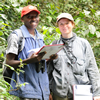
 |
Dr Amanda Korstjens, pictured right, with her assistant in Kibale, Uganda |
The latest edition of the prestigious journal “Biological reviews” (Impact Factor 8.8) contains an article by Robin Dunbar (Oxford University), BU’s Amanda Korstjens and Julia Lehmann (Roehampton University) about time budgeting decisions in animals.
Biol. Rev. (2009), 84, pp. 413–429. 413
doi:10.1111/j.1469-185X.2009.00080.x
Time as an ecological constraint
R. I. M. Dunbar, A. H. Korstjens and J. Lehmann
ABSTRACT:
Conventional approaches to population biology emphasise the roles of climatic conditions, nutrient flow and predation as constraints on population dynamics. We argue here that this focus has obscured the role of time as a crucial constraint on species’ abilities to survive in some habitats. Time constraints may be particularly intrusive both for species that live in intensely bonded groups (where the need to devote time to social interaction may ultimately limit the size of group that a species can maintain in a particular habitat) and for taxa that face constraints on the length of the active day. We use a linear programming approach that allows us to specify both how time allocations to different activities are influenced by local environmental and climatic variables and how these in turn limit group size and population density. The linear programming approach identifies the realizable niche space within which a species can maintain coherent groups that are larger than the minimum viable group size (or density). This approach thus allow us to understand better why a given taxon can survive in some habitats but not others, as well as the demographic stress that a population may face. In addition, they also allow us to evaluate the implications of both past and future climate change for a taxon’s ability to cope with particular habitats.
28/07/09